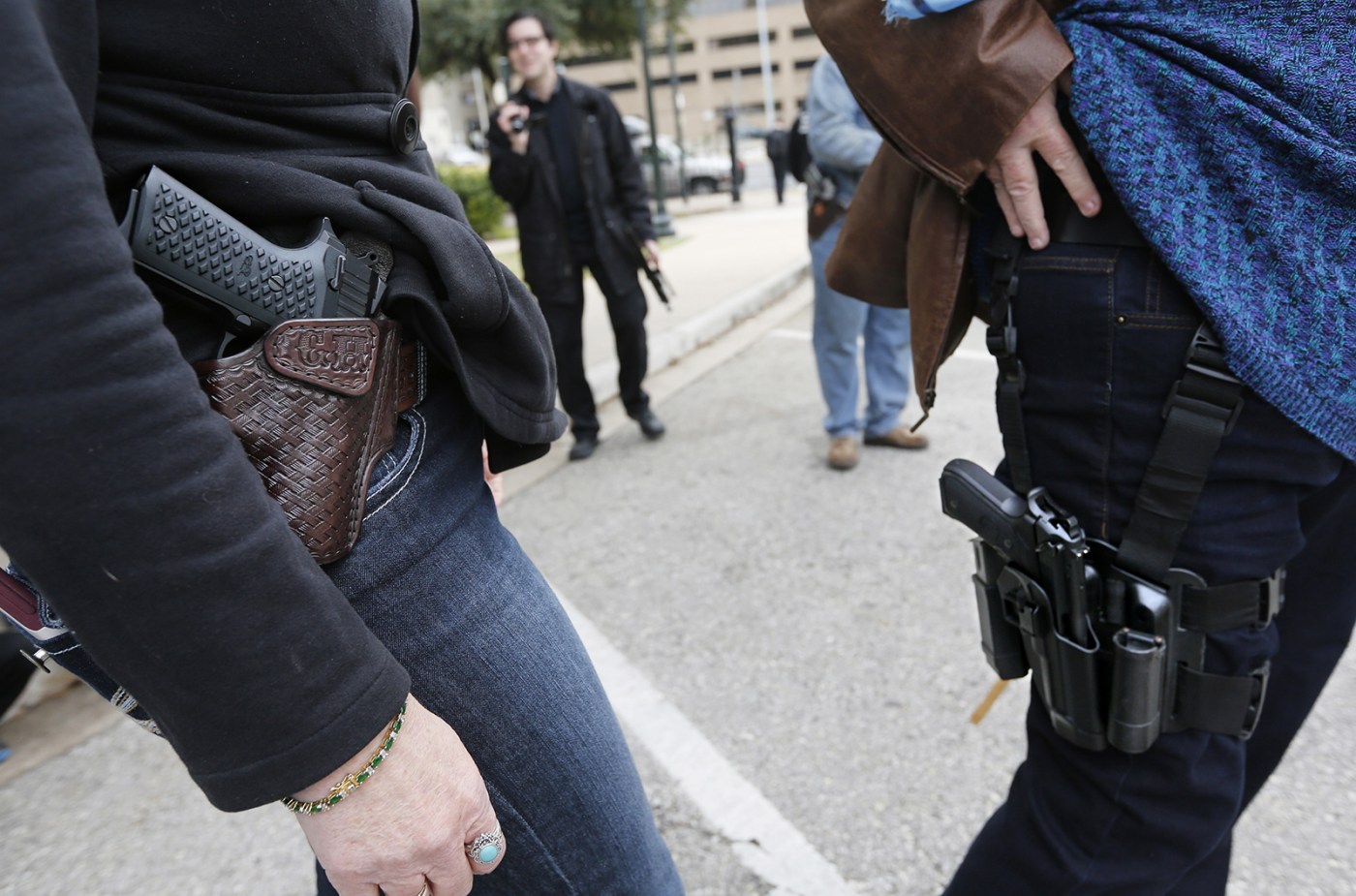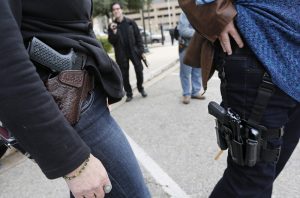
Fearing political violence, more states ban guns at polling places
Matt Vasilogambros | (TNS) Stateline.org
Facing increased threats to election workers and superheated political rhetoric from former President Donald Trump and his supporters, more states are considering firearm bans at polling places and ballot drop boxes ahead of November’s presidential election.
This month, New Mexico became the latest state to restrict guns where people vote or hand in ballots, joining at least 21 other states with similar laws — some banning either open or concealed carry but most banning both.
Nine of those prohibitions were enacted in the past two years, as states have sought to prevent voter intimidation or even violence at the polls driven by Trump’s false claims of election rigging. At least six states are debating bills that would ban firearms at polling places or expand existing bans to include more locations.
The New Mexico measure, which was supported entirely by Democrats, applies to within 100 feet of polling places and 50 feet of ballot drop boxes. People who violate the law are subject to a petty misdemeanor charge that could result in six months in jail.
“Our national climate is increasingly polarized,” said Democratic state Rep. Reena Szczepanski, one of the bill’s sponsors. “Anything we can do to turn the temperature down and allow for the safe operation of our very basic democratic right, voting, is critical.”
She told Stateline that she and her co-sponsors were inspired to introduce the legislation after concerned Santa Fe poll workers, who faced harassment by people openly carrying firearms during the 2020 presidential election, reached out to them.
The bill carved out an exception for people with concealed carry permits and members of law enforcement. Still, every Republican in the New Mexico legislature opposed the measure; many said they worried that gun owners might get charged with a crime for accidentally bringing their firearm to the polling place.
“We have a lot of real crime problems in this state,” said House Minority Floor Leader Ryan Lane, a Republican, during a House Judiciary Committee hearing last month. “It’s puzzling to me why we’re making this a priority.”
But over the past several years, national voting rights and gun violence prevention advocates have been sounding the alarm over increased threats around elections, pointing to ballooning disinformation, looser gun laws, record firearm sales and vigilantism at polling locations and ballot tabulation centers.
National surveys show that election officials have left the field in droves because of the threats they’re facing, and many who remain in their posts are concerned for their safety.
Add in aggressive rhetoric from Trump, the presumptive Republican presidential nominee, and it becomes “a storm” that makes it essential for states to pass laws that prohibit guns at polling places, said Robyn Sanders, a Democracy Program counsel for the Brennan Center for Justice, a voting rights group based at the New York University School of Law.
“Our democracy has come under new and unnerving pressure based on the emergence of the election denial movement, disinformation and false narratives about the integrity of our elections,” said Sanders, who co-authored a September report on how to protect elections from gun violence. The report was a partnership between the Brennan Center and the Giffords Law Center to Prevent Gun Violence.
“The presence of guns in these places presents a risk of violence,” she added.
Increased threat environment
Over the past four years, threats have gone beyond voicemails, emails or social media posts. Armed vigilantes have harassed voters at ballot drop boxes and shown up outside vote tabulation centers. Other people reportedly have shot at local election officials.
While several states have enacted laws in recent years criminalizing threats to election officials, some states want to take it a step further through gun restrictions.
This year, primarily Democratic lawmakers in Connecticut, Illinois, Massachusetts, Michigan Pennsylvania, Vermont and Virginia have introduced legislation that would ban most firearms in or near polling places or other election-related places. Most of these bills remain in committee.
Some of the states have seen political violence in recent years, including Pennsylvania, where a man tried to go into a Harrisburg polling place in November with a firearm and acted threateningly, confronting voters and pointing an unloaded gun at an unoccupied police cruiser.
A bill in Virginia to ban firearms at polling places got through the state legislature on a party-line vote this month, but Republican Gov. Glenn Youngkin has not yet acted on the legislation. His press office did not respond to a request for more information.
Two Democratic-backed bills in Michigan seek to ban most firearms at or within 100 feet of polling places, and ballot drop boxes and clerks’ offices during the 40 days before an election. They have passed the state Senate but await votes in the House.
Democratic state Rep. Penelope Tsernoglou, the sponsor of one of those bills, told Stateline she expects the legislation to pass in April, after special elections fill two vacant seats.
“We want to make sure that we’re able to attract the needed election workers, and that they feel safe doing those jobs,” she said. “Sadly, we’re seeing more and more gun violence throughout our state and our nation. And I strongly believe that everyone should feel safe when they’re voting.”
But these bills are “good for headlines and nothing else,” said GOP state Sen. Jim Runestad in a statement on the Senate Republicans’ website.
“When one considers the sheer number of drop boxes placed throughout larger communities, like in the city of Detroit, these places could be nearly impossible to avoid,” he wrote, referring to gun owners.
One of his proposed amendments that failed would have exempted gun owners carrying guns for non-election-related business, such as going into a store near a ballot drop box.
In 2020, Democratic Secretary of State Jocelyn Benson attempted to ban firearms within 100 feet of polling places, clerks’ offices and absentee ballot counting centers. But Michigan courts blocked her effort, finding she didn’t have the authority.
Michigan was one of many states where election officials faced violent threats during the 2020 presidential election. Last month, a man pleaded guilty to federal charges for threatening the life of former Rochester Hills Clerk Tina Barton, saying she deserved a “throat to the knife.”
There is broad bipartisan support among voters to ban firearms at polling places. According to a 2022 poll of more than 1,000 adults commissioned by the Global Project Against Hate and Extremism, nearly 80% of Democrats and more than half of Republicans and independents polled thought guns should be banned at polling places. Overall, 63% of adults surveyed supported a ban.
But that cross-party support has not translated to state legislatures.
Where are the bans?
Democratic-controlled states have spearheaded the effort to ban firearms at polling places in recent years, with only a handful of Republican lawmakers joining Democrats to pass the bills in some states.
In 2022, Colorado, New Jersey, New York and Washington state passed firearm restrictions at polling places. In 2023, California, Delaware, Hawaii and Maryland joined the list.
Nevada’s majority-Democratic legislature passed a similar ban last year, but Republican Gov. Joe Lombardo vetoed it. He said the measure would have infringed on the constitutional rights of Nevadans.
Maryland’s ban is facing a legal challenge from gun rights groups and activists who argue such bans infringe on Second Amendment protections and are ineffective.
“It’s a solution looking for a problem,” said Andi Turner, a spokesperson for the Maryland State Rifle and Pistol Association, which is part of the lawsuit challenging the law. “We don’t have people threatening at polling places or going and shooting up election workers. I don’t see why this needs to be a thing.”
The states that had polling place firearm bans prior to the 2020 presidential election now have Republican-controlled legislatures: Arizona, Florida, Georgia, Louisiana, South Carolina and Texas.
Georgia’s ban dates back to 1870, and in 1874 the state Supreme Court wrote that having a firearm at a polling place “is a thing so improper in itself, so shocking to all sense of propriety, so wholly useless and full of evil, that it would be strange if the framers of the constitution have used words broad enough to give it a constitutional guarantee.”
More Republican-led states should consider firearm prohibitions at polling places, said Jessie Ojeda, the guns and democracy attorney fellow at the Giffords Law Center, and one of the co-authors of the joint Brennan and Giffords report.
Gun safety advocates such as Ojeda see an opening for these laws, even after the U.S. Supreme Court’s 2022 decision that widened the definition of protected firearm access. While the court struck down New York’s law that prohibited firearms in public, it did leave open the potential for bans in “sensitive places,” specifically noting polling places.
“We need to take action before 2024,” said Ojeda. “We have a growing number of incidents when firearms are thankfully not being used to shoot people, but they are being used to intimidate and deter voters and election officials from doing their job.”
Stateline is part of States Newsroom, a national nonprofit news organization focused on state policy.
©2024 States Newsroom. Visit at stateline.org. Distributed by Tribune Content Agency, LLC.


